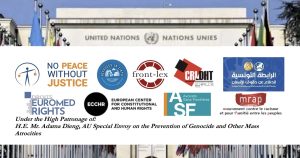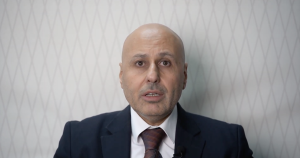So far, UNSMIL’s efforts to bring the crisis to a close have focused on the creation of a unity government and the establishment of multiple councils and consultative bodies, rather than on the basic principles and values which should underpin them, and even less on how these bodies will guarantee equality in front of the law, accountability and personal responsibility for all citizens. These are fundamental elements without which a democratic, peaceful and stable regime cannot be established or sustained. Unless it is an opportunity to discuss and agree on redress, reparations, and mechanisms to ensure non repetition, UNSMIL’s proposals risk little more than “institutional engineering” designed to provide a seat for every player in one of many committees or councils, without addressing any of the fundamental issues at the basis of the current political and humanitarian crisis.
For the political and diplomatic mediation process to succeed, it has to address the need for concrete accountability and transitional justice strategies that can have a tangible and constructive effect on reconciliation and progress in Libya, including in particular the strengthening of the judicial system, providing both the expectation and the reality of individual accountability for current violations and a comprehensive understanding of the past, all of which are necessary in order to build a credible and far reaching political solution in Libya.
The upcoming UPR working group session on Libya, in May 2015, can serve as a platform to initiate genuine action in the sphere of accountability and human rights and in particular focus on the need to act swiftly on the following critical issues:
- ratify the Rome Statute of the International Criminal Court and enact implementing legislation to incorporate Rome Statute crimes in Libyan law;
- announce a moratorium on all executions imposed by military and civilian courts and ensure full compliance with the restrictions prescribed in article 6 of the ICCPR;
- regularise the prison system and ensure that all prisons and detention facilities are managed and controlled by Libyan State authorities alone;
- address past and ongoing violations of women’s rights and ensure the effective implementation of UNGA Resolutions 67/146 and 69/150 to ban female genital mutilation.
Read also:
- Libya: NPWJ presents recommendations on human rights, rule of law and transitional justice to the members of the UN Human Rights Council, Geneva, 10 April 2015
- Libya: NPWJ and its Libyan partners submit recommendations for consideration at the 22nd Session of the UPR Working Group, Geneva, 8 October 2014
NPWJ project on Libya
NPWJ has been working on the Libyan transition since early 2011, in the framework of its project to support Libya’s democratic transition through justice and accountability. Libyan authorities can break with the legacy of impunity and abuses that typified Gaddafi’s rule with a new respect for the rule of law and a commitment to restoring justice and dignity to victims. Doing so requires not only the investigation and prosecution of the ongoing crimes and violence, but also efforts to confront a history of oppression and human rights abuses that dates back decades under the rule of the former regime.
For further information, please contact Gianluca Eramo (MENA Democracy program Coordinator) on geramo@npwj.org or Nicola Giovannini (Press & Public Affairs Coordinator) on ngiovannini@npwj.org or +32-2-548-3915.




